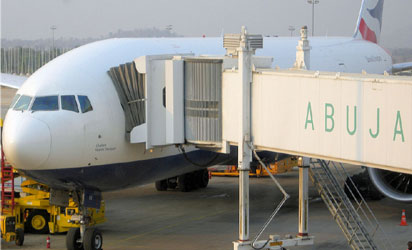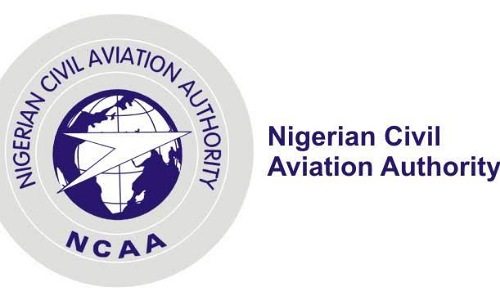Aviation
ICAO rates Nigeria high on safety
International Civil Aviation Organisation (ICAO) has rated Nigeria high on safety on its’ aviation industry and the safety oversight supervised by the Nigerian Civil Aviation Authority (NCAA).

By Daniel Eteghe
International Civil Aviation Organisation (ICAO) has rated Nigeria high on safety on its’ aviation industry and the safety oversight supervised by the Nigerian Civil Aviation Authority (NCAA).
This is coming barely two months after the ill-fated Dana air crash on June 3, 2012, which killed over 163 people onboard and on ground and was characterised with a lot of accusation and criticism from some quarters against the regulatory body.
 According to a letter signed by the President of ICAO, Mr. Roberto Kobeh Gonzalez and made available to journalists yesterday in Lagos, Mr. Gonzalez pointed out that Nigeria was one of the 13 countries out of 54 in Africa continent whose Level of Effective Implementation (LEI) of the eight critical elements of ICAO safety oversight was above the world average.
According to a letter signed by the President of ICAO, Mr. Roberto Kobeh Gonzalez and made available to journalists yesterday in Lagos, Mr. Gonzalez pointed out that Nigeria was one of the 13 countries out of 54 in Africa continent whose Level of Effective Implementation (LEI) of the eight critical elements of ICAO safety oversight was above the world average.
He said” ICAO maintains that NCAA has satisfactorily established and implemented the eight critical elements in a consistent way, scoring 86 per cent in compliance during the audit exercise conducted by its officials”
According to him, the eight critical elements are legislation, regulation, organisation, technical staff and training, technical guidance and tools, licensing, certification, approval, continuous surveillance and resolution of safety concerns”
It will be recalled that International Air Transport Association (IATA) and ICAO in July reiterated confidence in the ability of the Director-General of NCAA, Dr. Harold Demuren.
In a letter jointly signed by the President and Secretary General of ICAO, Mr. Roberto Kobeh Gonzalez and Raymond Benjamin respectively with the reference number E1/1.109 E.ANB/SS145236 written to Jonathan and copied Minister of Aviation, Princess Sella Oduah and the Representatives of Nigeria on the council of ICAO, ICAO said it recognised the safety efforts of the country in recent time.
The letters made available to journalists by a source close to the Ministry of Aviation, however hoped that the outcome of the investigations of the two accidents, the cargo plane in Ghana and Dana air in Nigeria would be implemented by the government to serve as a guide for future accidents.
The ICAO letter reads in part, “At a time, we would like to reinforce our ongoing confidence in your strong leadership and commitment to aviation safety in Nigeria and indeed in Africa as a continent. We have personally witnessed your tireless work over a number of years to improve Nigeria’s regulatory capability and to share this good work with other Directors-General throughout Africa.
“Please know that ICAO stands ready to assist you in any way as you investigate these accidents and has every confidence that you will personally implement any recommendations emanating from the accident investigations.”
Also, IATA in its letter to Jonathan, which was copied to Oduah and Demuren promised to support the country during this difficult period.
IATA maintains that aviation remains the safety mean of travel anywhere in the world, but despite this, accidents still occur in the sector.
IATA said that the country should be proud that the commitment of the government to the safety and security of air transport system had resulted in an impressive overall safety record in the Nigerian aviation industry.
Aviation
JUST IN: Emirates Airlines Set To Restore Flights To Nigeria
Emirates Airlines has announced plan to resume flight operations to Nigerian airports on October 1, 2024, after a two-year hiatus.
The news was shared by the airline on its verified X handle on Thursday.
It stated, “We’re back Nigeria! We’ll be resuming services to Lagos from 1 October 2024, and we can’t wait to offer unrivalled connectivity to Dubai and beyond to over 140 cities.”
The development was hinted at earlier by Nigeria’s Minister of Aviation and Aerospace Development, Festus Keyamo, SAN.
In a post on X on Wednesday, Keyamo disclosed that he met with the Ambassador of the United Arab Emirates (UAE) to Nigeria, Salem Saeed Al-Shamsi, in Abuja on Tuesday.
He stated that during the meeting, Al-Shamsi handed him a correspondence from Emirates Airlines confirming the flight resumption date.
The Minister wrote “Yesterday (On Tuesday), I paid a working visit to the Ambassador of the UAE to Nigeria, His Excellency, Salem Saeed Al-Shamsi at the UAE Embassy in Abuja.
“He handed me a correspondence from the Emirates Airline indicating a definite date of their resumption of flights to Nigeria. That date will be formally announced by Emirates Airlines in a matter of days.”
The announcement signifies another step taken by the Nigerian government to reinstate flight operations between Nigeria and the UAE.
In November 2023, Minister Keyamo had announced that Emirates Airlines would soon disclose the exact date of their return to Nigerian skies.
The flight suspension between the two nations had been amidst a broader diplomatic dispute, primarily concerning the Bilateral Air Services Agreement (BASA).
Visa restrictions further exacerbated the situation, impacting numerous Nigerian migrants and tourists, given the UAE’s popularity as a destination.
Recall that Emirates Airlines suspended its flights to Nigeria in 2022 due to challenges in repatriating funds trapped in the country.
Despite a meeting in September 2023 between Nigeria’s President Bola Tinubu and UAE President Mohamed bin Zayed Al Nahyan in Abu Dhabi, where there were rumors that the UAE had lifted its visa ban on Nigerian travelers, the ban still stands.
Presidential spokesman Bayo Onanuga later clarified that the UAE had not lifted the visa restrictions on Nigerians.
Aviation
JUST IN: NCAA Suspends 3 Jet Operators

The Nigerian Civil Aviation Authority (NCAA) has taken action by suspending the permits of three private jet operators due to their involvement in commercial flights.
Chris Najomo, the Acting Director General of the NCAA, issued this suspension during a briefing to all airlines on Tuesday.
Additionally, Najomo ordered a re-evaluation of all PNCF permits within a 72-hour timeframe.
The head of the NCAA stated that Festus Keyamo, the Minister of Aviation and Aerospace Development, had instructed the discontinuation of private jets’ commercial use in 2023.
Despite this directive, the operators persisted in their commercial activities.
Najomo said “Subsequently, in March 2024, the NCAA had issued a stern warning to holders of the permit for non commercial flights, PNCF, against engaging in the carriage of passenger cargo or mail for hire and reward.
“The Authority had also deployed its officials to monitor activities of private jets at terminals across the airports in Nigeria.
“As a consequence of this heightened surveillance, no fewer than three private operators have been found to be involved in violation of the annexure provision of their PNCF and Part 9114 of the Nigeria Civil Aviation Regulations 2023.
“In line with our zero tolerance for violation of regulations, the Authority has suspended the PNCF of these operators.”
Aviation
Keyamo Charges NCAT To Produce 4,203 Controllers By 2037

Minister Festus Keyamo has urged the Nigerian College of Aviation Technology in Zaria, Kaduna State, to create new solutions that can speed up the training of skilled air traffic controllers.
This call comes as Africa anticipates a need for 4,203 new air traffic controllers by the year 2037.
The minister made this statement on Wednesday during the 34th IFATAC Africa and Middle East Regional meeting in Abuja.
Addressing the gathering, the minister noted that the goal of training 4,203 new air traffic controllers aligns with the projection from the International Civil Aviation Organization (ICAO).
He further affirmed the ministry’s commitment to offering full support to NCAT, ensuring it not only meets but surpasses its mandated duties and roles.
He said “ICAO projects that by the year 2037, Africa will require 4,203 new air traffic controllers. The onus rests on the Aviation College of Aviation Technology (NCAT) to develop innovative ideas solutions to accelerate the training of new and proficient air traffic controllers.
The minister, represented by acting director Michael Chiko from Air Safety and Administration, highlighted the rapid evolution of the air traffic control profession.
He stated “The profession of air traffic control has evolved rapidly, transitioning from simple flag signalling to sophisticated technologies. This evolution facilitates management of the surging number of aircraft traversing our
skies daily.
“As a vital, indispensable component of air safety, air traffic controllers are responsible for the safe, orderly and expeditious flow of air traffic. Therefore, I am not unaware of the critical role you play and invariably, the heavy burden you bear.
“This burden is compounded by increased air traffic, workforce shortages, technological shifts; necessitating rigorous training regimes.
“More so, with the emergence of unmanned aerial vehicles, reshaping dynamics and challenging the norm, it is thus paramount to prepare for the future and indeed Nigeria like other countries must prepare for the future.” he added
During the event, Mr. Lawrence Pwajok, representing Engr. Mohammed Odunowo, the managing director of the Nigerian Airspace Management Agency (NAMA), emphasized the relevance of the 34th IFATCA Africa and Middle East Regional meeting’s theme, titled ‘Shaping the Future: Trends and Insights On ATC Training for Tomorrow’.
Pwajok highlighted the significance of this theme, especially as air traffic control commemorates 100 years since its inception.
He suggested examining the historical perspective of air traffic control, tracing its origins from Croydon airport a century ago to its present form in modern airports like Dubai, Istanbul, JFK, Charles De Gaulle, among others.
This historical comparison aims to provide insights into the potential trajectory of the future air traffic control system over the next century.
He added “It is obvious that the future air traffic management system will be characterised by extensive application of automation, digitization and artificial intelligence.”










